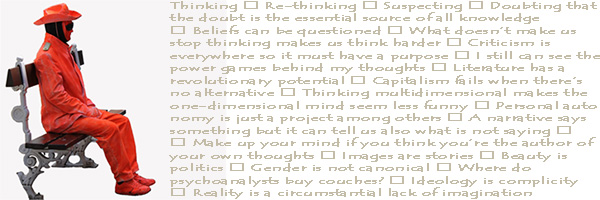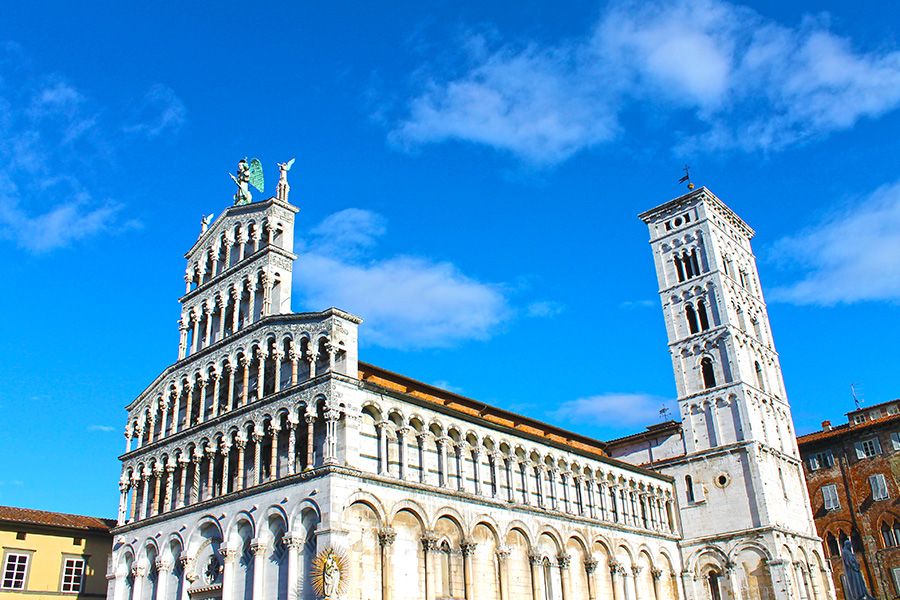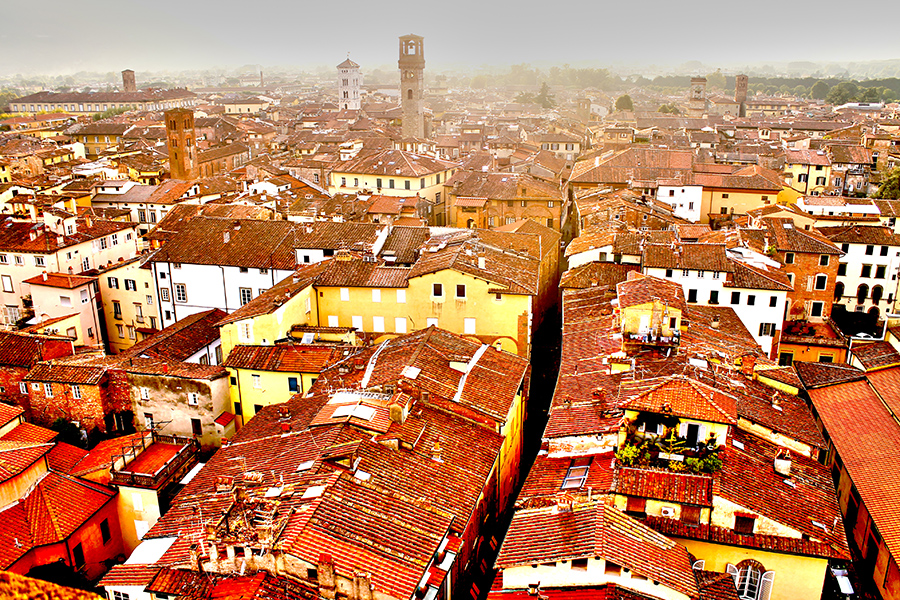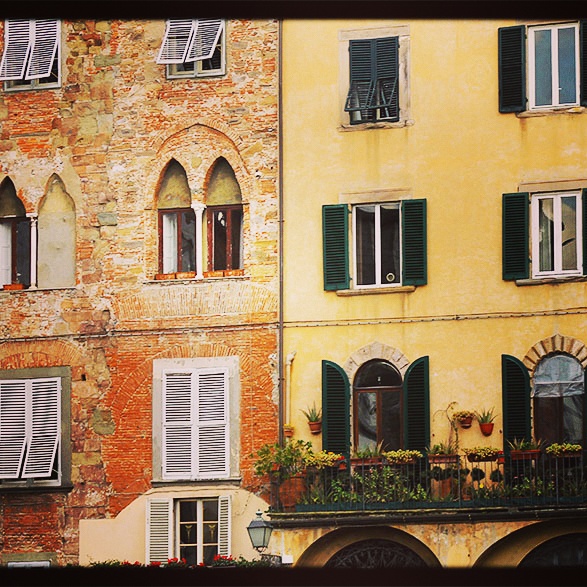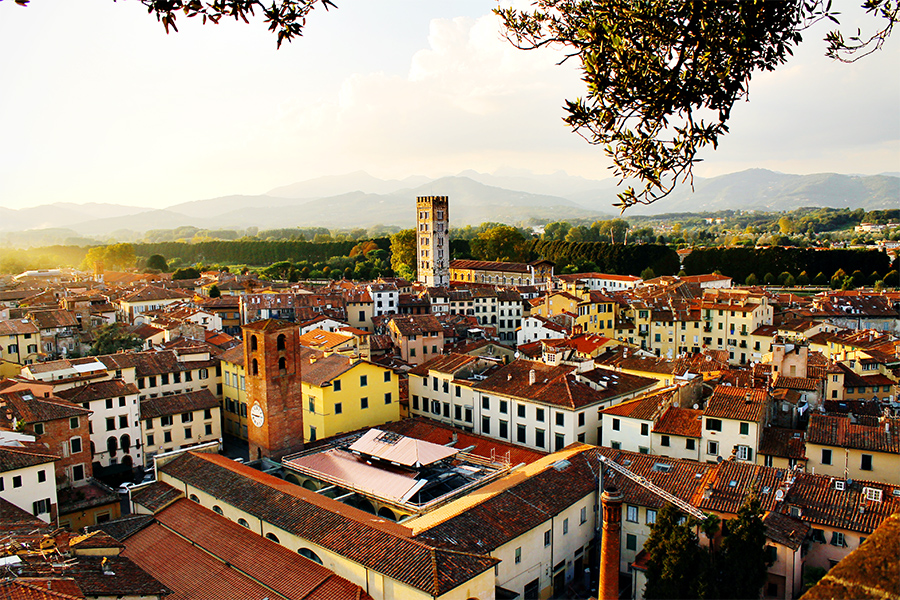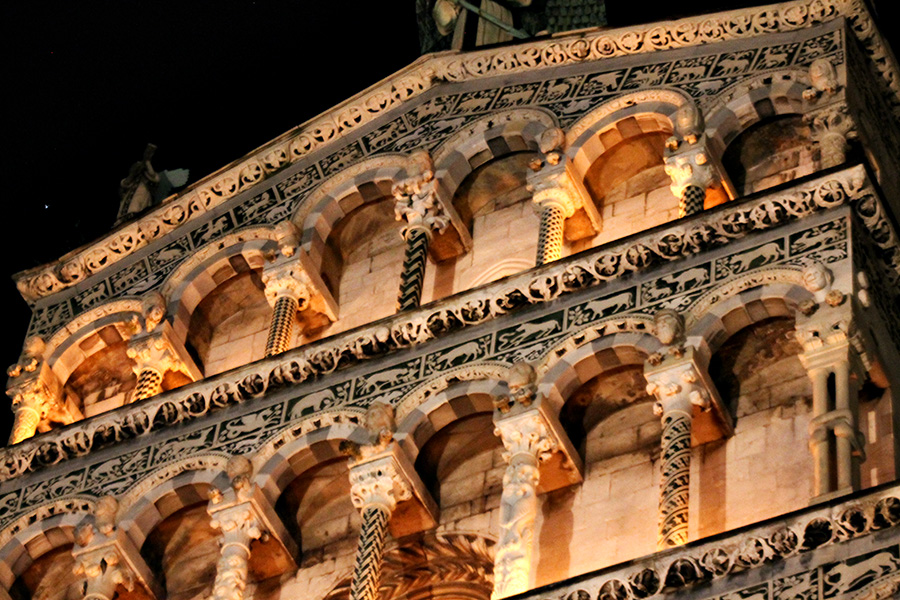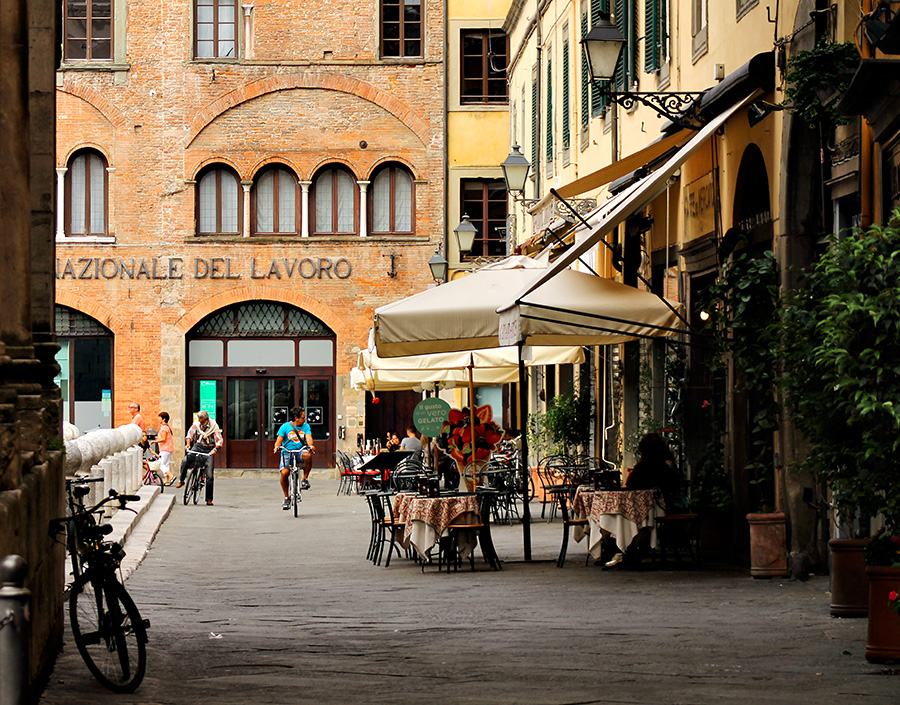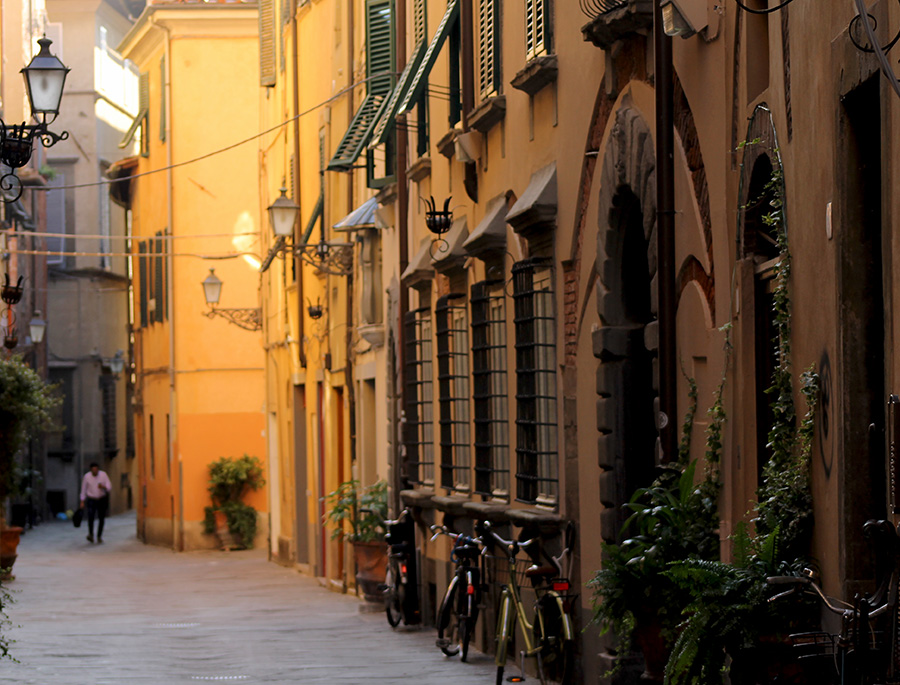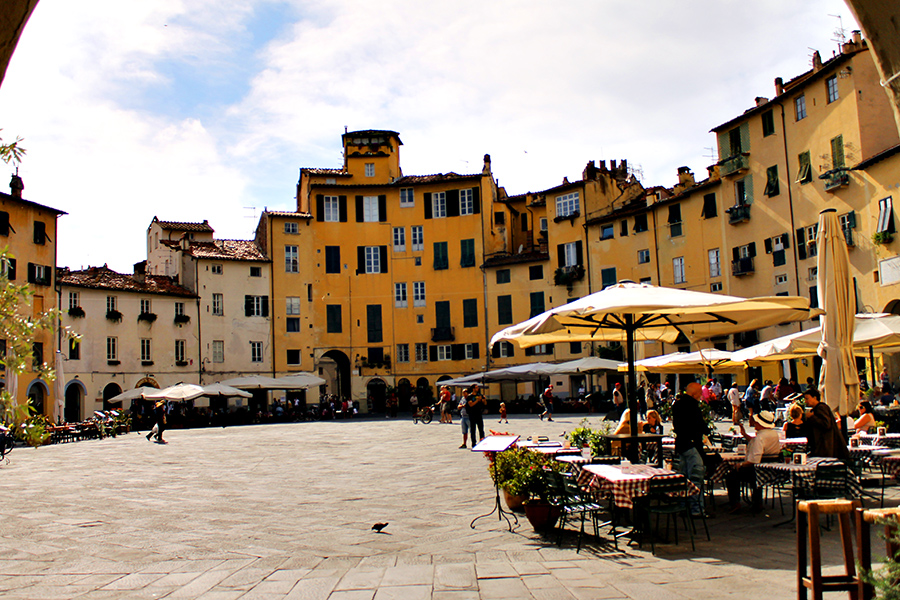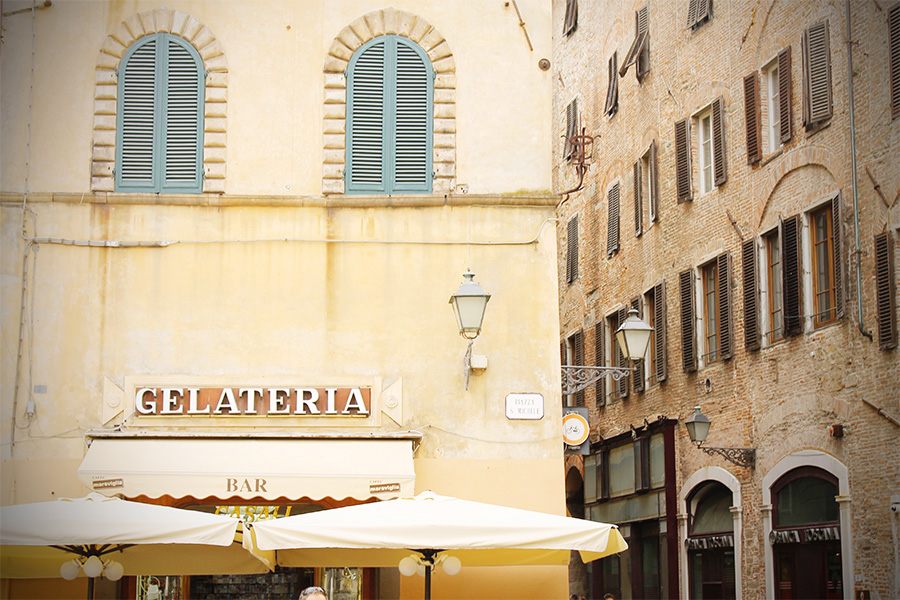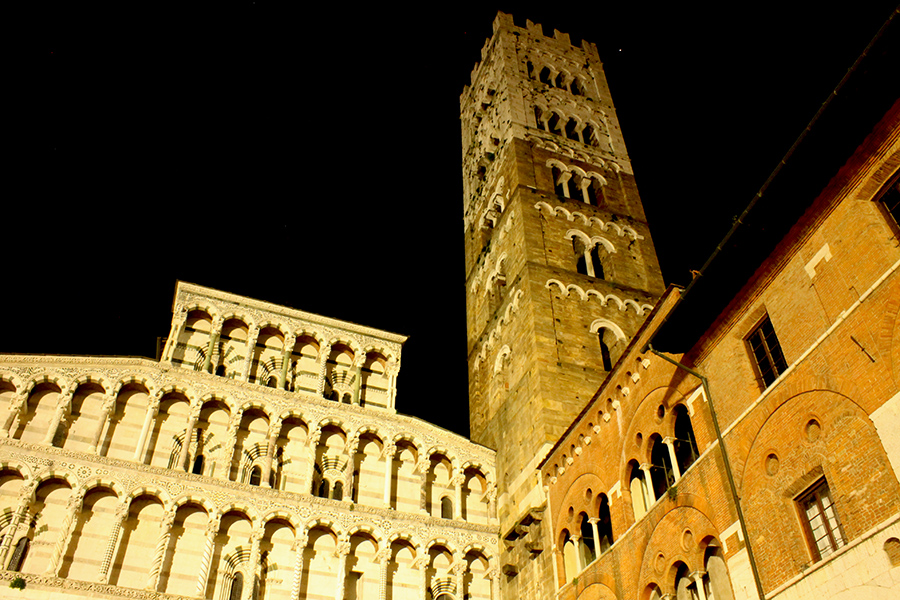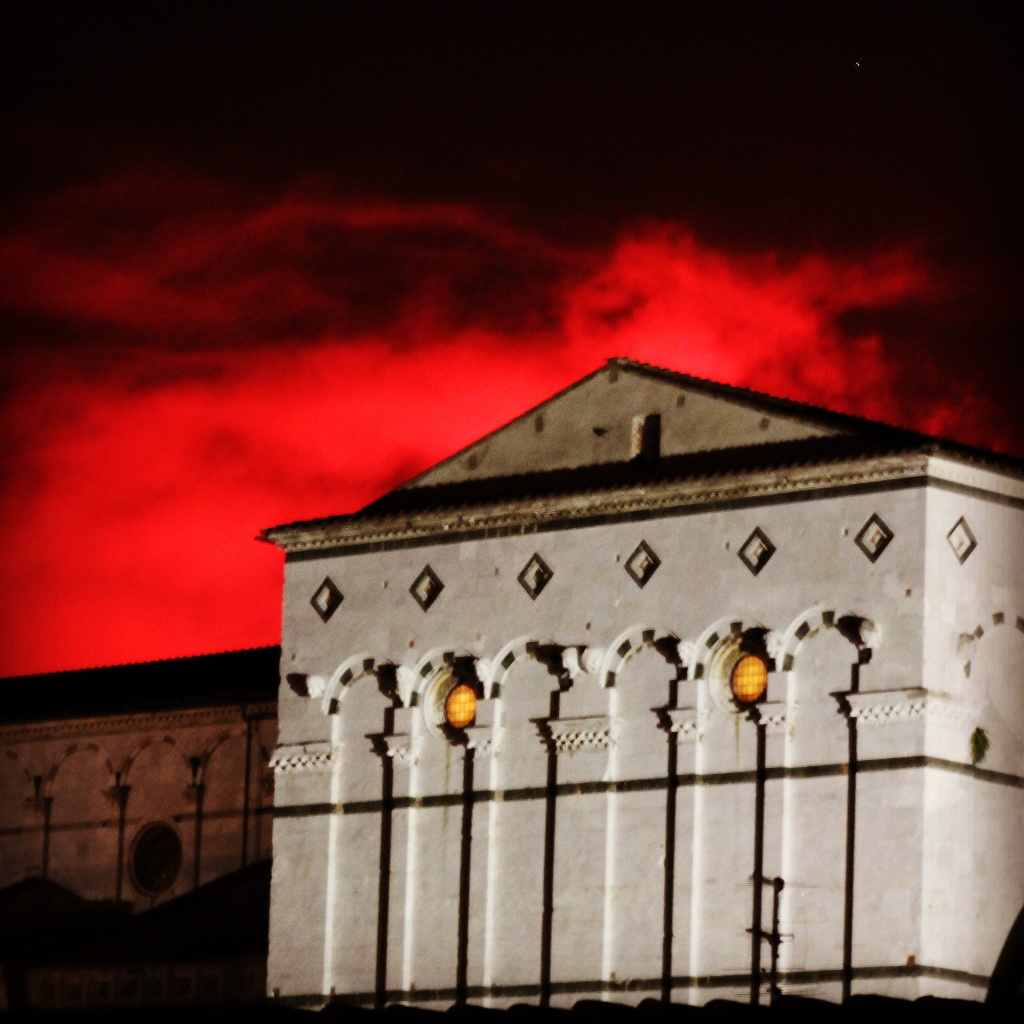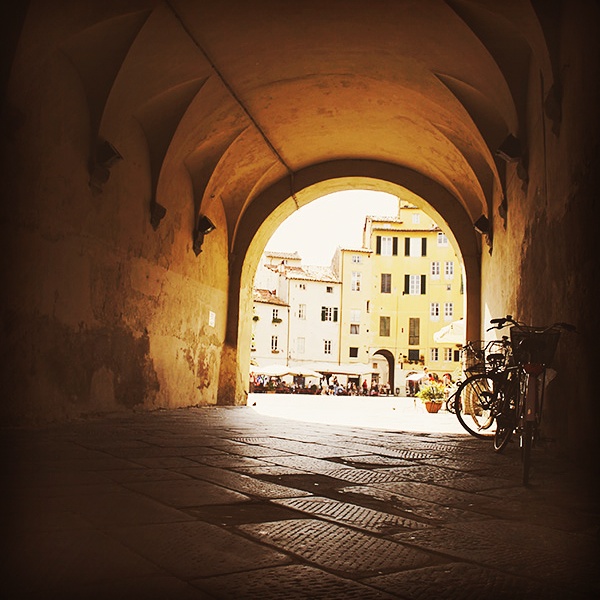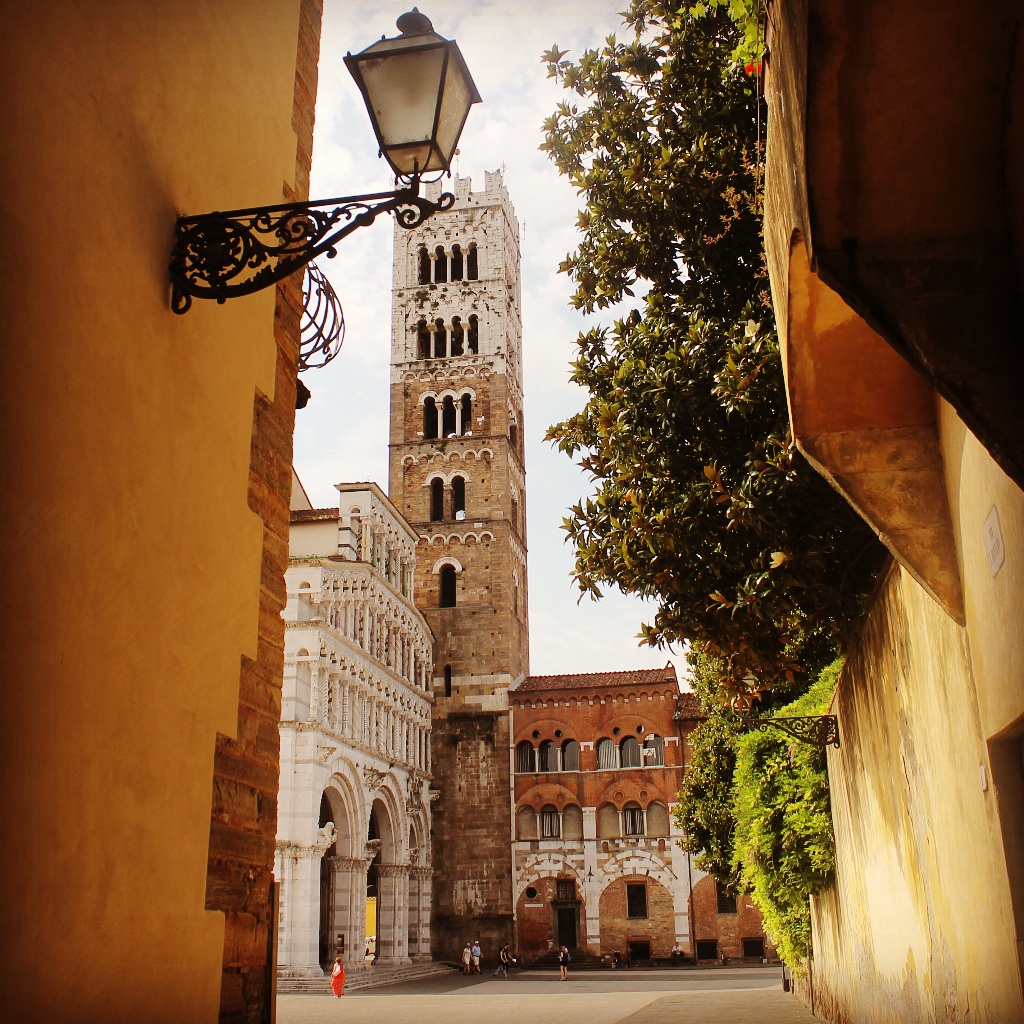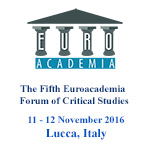Palazzo Bernardini
Conference Room: Giacomo Puccini
Via Santa Croce 41
Lucca, Italy 55100Conference Agenda
- November 11, 2016
- 09:00 - 09:30Participants Registration (Registration Desk)
- 09:30 - 10:30Welcome and Opening Remarks / Open Floor Workshop: Critical Times Call for Critical Thinking ~ Asking Big Questions Again
- 10:30 - 11:00Coffee Break and Snacks (Café Fellini)
- 11:00 - 13:00Panel 1: Politics of Cultural Heritage: Memory, Identities and Memorialization – Monuments, Urban Images and Institutional Strategies
- 13:00 - 14:30Tuscan Specialties Lunch – Restaurant Bernardini
- 14:30 - 16:30Panel 2: Identity and the Cities: Urban Transformations, Transition and Change in Urban Image Construction
- 16:30 - 17:00Coffee Break and Snacks (Café Fellini)
- 17:00 - 19:00Panel 3: Performing Identities: Gender, Sexuality, Power and the Relationship between Identity and Performance in Literature, Performing Arts and the Sequential Arts
- 19:00 - 19:45Welcome Drink – 'Aperitivo' in Lucca
- 19:45 - 21:00Optional Social Tuscan Dinner in Lucca
- November 12, 2016
- 08:30 - 10:30Panel 4: Art, History and Representations of Identity
- 10:30 - 11:00Coffee Break and Snacks (Café Fellini)
- 11:00 - 13:00Panel 5: Asking Big Questions Again: Critical Theory, Autonomy, Philosophy and Culture
- 13:00 - 14:30Tuscan Specialties Lunch – Restaurant Bernardini
- 14:30 - 16:30Panel 6: Critical Contemporary Politics: Assessing EUropean (Dis)Integration
- 16:30 - 17:00Coffee Break and Snacks (Café Fellini)
- 17:00 - 19:00Panel 7: Thinking Culture: Difference, Dynamics and Change
- 19:00 - 19:30Concluding Remarks and Discussions
- 19:30 - 21:00Optional Social Tuscan Dinner in Lucca
- November 11, 2016
The Fifth Euroacademia Forum of Critical Studies: Asking Big Questions Again

- Conference Description
- Participant’s Profile
- Registration and Fee
- Social Activities and Publication
- Important Dates
- Venue and Directions
- Conference Program
- Panel 1
- Panel 2
- Panel 3
- Panel 4
- Panel 5
- Panel 6
- Panel 7
The Fifth Euroacademia
Global Forum of Critical Studies
Asking Big Questions Again
11 – 12 November 2016
Palazzo Bernardini
Lucca, Tuscany, Italy
Call For Panels and Papers
Some say that the 21st Century or modernity altogether made humans more concerned with doing rather than being. As the classical Greek civilization valued most the reflexive thinking as a form of freedom from natural necessities, contemporary times profoundly involve individuals and the imaginary accompanying social practices in a restless logic of consumption, competition and engagement that profoundly – or some would say, radically – suspends or indefinitely postpones the autonomous capacity of human beings to question and reflect upon the social order and the meaning of social practices. The fast advancement of a peculiar logic of post-industrial societies, the gradual dissolution of alternative models to the capitalist logic and a multitude of other alerting factors pushed ahead a global spread culture of one-dimensional productions of meaning that advances a closure rather than a constant reflexive re-evaluation of cultural and social practices.
Many alternatives at hand are often condemned to marginality or lost in the quasi-plural practices where everything goes as long as it’s part of an intellectual market. The ‘fatal strategies’ of post-industrial societies to keep individuals captive, busy and seduced by contingent social arrangements and economic practices minimized the questioning detachment required to evaluate and give meaning through reflexive criticism and unlimited interrogation. Various labels were given to our unfolding times from apocalyptic ones to some more comforting yet, not by chance, lacking some vital optimism. Despite a wide-spread discontent and suspicion towards daily realities of our current societies, most of big questions are often left outside by the self-involved active pursuit of an imagined well-being that is no longer transgressed by harsh critical evaluation of its meaning. The academic arena itself also advances, supports, integrates and promotes limited particular methodologies that generate an effect of mainstreaming and often keeps researchers or practitioners out of the battle-ground for big questions.
The ongoing economic crisis made reality even harsher and pushed ahead the need for more thinking as many habitual categories lost their meaning or relevance. New ways of thinking could transgress some inappropriate conceptions or misconceptions that preserve their centrality due to the mechanics of habit. This is a time when a call to thinking is well-placed. This is a call to arms for critical studies that promotes alternative, questioning and multidimensional thinking. It is based on the belief that thinking more is asking more and the answers come from creative constructive reasoning if left unbiased.
The Fifth Euroacademia Global Forum of Critical Studies aims to bring into an open floor the reflexive and questioning interaction among academics, intellectuals, practitioners and activists profoundly concerned with evaluative understandings of the world we’re living in. The focus of the forum is to initiate an arena where no question is misplaced and irrelevant as long as we acknowledge that evaluation, critical thinking and contestation are accessible trajectories to better understand our past, present and alternative scenarios for the future. The Forum is also an open stage for sharing existing or ready formed intellectual visions and expose them to dialogue and scrutiny in a critically reflective environment.
Participant’s Profile
The conference is addressed to academics, intellectuals, researchers, professionals / practitioners and activists profoundly concerned with evaluative understandings of the world we’re living in. The conference aims to stimulate critical reflection and therefore intellectual exercises in critical thinking beyond professional and disciplinary boundaries are given preference and strongly welcomed. As the nature of the conference is intended to be multidisciplinary in nature and critically dialogical in practice, different academic backgrounds and levels are equally welcomed.
Post-graduate students, doctoral candidates and young researchers are welcomed to submit an abstract. Representatives of INGOs, NGOs, Think Tanks and activists willing to present their work, research, experiences or reflections are welcomed as well to submit the abstract of their contribution. Euroacademia does not promote the ‘byzantine’ association of people with their institutions. As well the distinction between senior and junior researchers is not applied as a cleavage.
Abstracts are reviewed by the Selection Committee and the participants are selected based on the proven quality of the abstract. The submitted paper for the conference proceedings is expected to be in accordance with the lines provided in the submitted abstract.
Registration and Fee
Registrations Process is Closed
The Participation Fee Includes:
- the registration fee
- participant’s package with all the materials for the conference
- eligibility for publishing of the presentation in the conference volume
- a copy of the electronic volume
- access to Euroacademia discussion group and newsletters
- 2 daily coffee brakes with typical Italian snacks and refreshing drinks during the conference (water/sodas)
- sparkling wine Tuscan aperitivo with snacks on 11th of November 2016
- a 3 course Tuscan specialties lunch on 11th of November 2016
- a 3 course Tuscan specialties lunch on 12th of November 2016
- certificate of attendance
- access to optional social program
- an optional guided walking tour of Lucca on Sunday 13th of November 2015
Unfortunately, Euroacademia has no available funds for covering transport and accommodation to/in Lucca. Participants are responsible for securing funding from their institutes of affiliation to cover transportation and accommodation costs during the whole period of the conference. Official invitation letters can be sent by Euroacademia to the financing institution to confirm the selection and participation in the conference upon request.
Social Activities and Publication
A specific spot in the conference program will be dedicated to social networking and therefore all the participants interested in setting or developing further cooperation agendas and prospects with other participants will have time to present and/or promote their project and express calls for cooperation.
Photos and videos will be taken during the conference and the organizers will consider through the participation of selected presenters or members of the audience that the agreement for being photographed or filmed during the event was granted through registration to the event. Please notify the organizers in written form prior to the the event if you are a confirmed participant and would prefer otherwise.
A specific setting (Social Corner) for promotional materials connected with the topic of the conference will be reserved for the use of the participants. Books authored or edited by the participants can be exhibited and promoted during the whole period of the conference and can also be presented within the conference package based on prior arrangements.
An optional dinner as socializing event will be organized for the first and second evening of the conference in a typical Italian cuisine restaurant as optional program for the willing participants. The social dinner will be held based on participant’s prior confirmation and it will cost around 25 Euro to be covered by the participants individually on-site at the restaurant.
Publication:
Selected papers will be published in an electronic volume with ISBN after the confirmation of the authors and a double peer-review process based on an agreed publication schedule. All the papers selected for publication should be original and must have not been priory published elsewhere. All participants to the conference will receive a copy of the volume.
| Important Dates & Deadlines | |
|---|---|
| 1st of June 2016 | Deadline for Submitting Panel Proposals |
| 1st of July 20169th of September 2016 | Paper Proposal Deadline – 300 words abstracts and details of affiliationExtended Deadline |
| 10th of September 2016 | Latest notification of acceptance |
| 12th of September 2016 | Sending the Registration Form |
| 29th of July 2016 | EARLY BIRD RATE deadline for payment of the conference participation fee |
| 20th of September 2016 | Payment of the conference participation fee |
| 21st of October 2016 | Sending the draft paper to be uploaded on the web site of the conference |
| 30th of October 2016 | Publication of the conference program and uploading the draft papers on the website |
| 11th of November 2016 | The conference commences at 9.00 am |
Venue and Directions
The conference will take place in the XVIth century Palazzo Bernardini, centrally located in the heart of Lucca, few steps away from the Piazza San Michele with its beautiful San Michele in Foro church and the renaissance walls that surround the historical city, making easily accessible within a walking distance any part of its amazing Middle Ages or Renaissance treasures. Via Santa Croce, 41 Lucca is one of the most beautiful cities of Tuscany, a treasure of beauty, culture and history, preserving exquisitely the signs of past kingdoms and dominions, the beauty of nature and the works of many renown architects and artists. Dante spent a part of his exile in Lucca. Located between Florence and Pisa, Lucca is the home town of Giacomo Puccini and Luigi Boccherini. Is a town where each of the streets has a story to tell. The city walls are the best preserved Renaissance walls in the world, offering the opportunity of a relaxing and enchanting ‘passeggiata’ (promenade) or a bike ride with amazing views over the surroundings. Piazza Napoleone -one of the main squares – was built in the time of Napoleonic conquest when the city was led by Napoleon’s sister Elisa Bonaparte. It is rivaled in beauty by Piazza del Amfiteatro, built to maintain the shape of the Roman Amphitheater built during the I and II centuries that could accommodate over 10,000 spectators. A city of 100 churches, Lucca is a labyrinth of small streets that hide secrets to be discovered.
Palazzo Bernardini
55100 Lucca
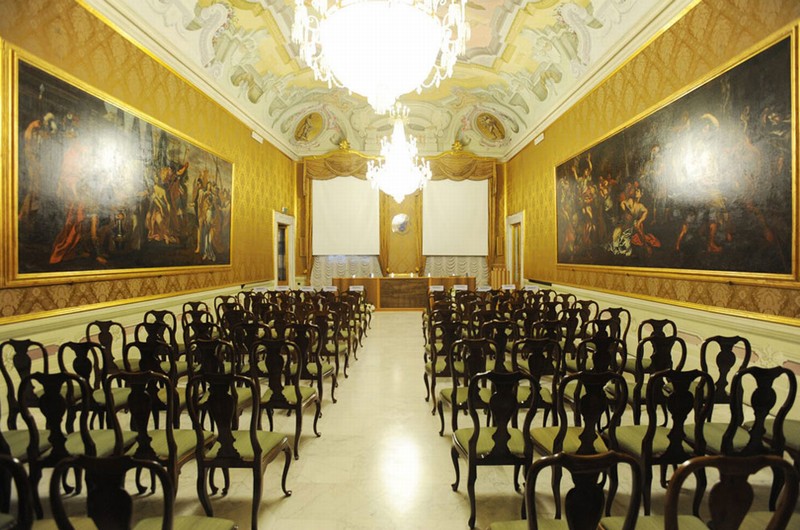
Lucca is very easy to reach both by bus as well as train from both Pisa and Florence, making it perfect for anyone getting around solely on public transportation. The train station is right outside the southern walls, with an entrance below the balcony of San Colombano that brings you right behind Lucca’s cathedral and into the heart of the small walled town. When arranging your travel by plane, book a flight to Florence (Petrola) or Pisa (Galileo Galilei) airports. The easiest way to reach Lucca is from Pisa airport that requires a 25 minutes public bus or train travel right from the airport. From Florence the travel by bus or train takes about 50 minutes. Make sure that your flight arrives earlier during the day as after 22.00 buses or trains to Lucca are no longer available. Taxis are available in Pisa airport and will cost around 50 Euro until your destination in Lucca. If your flight arrives later in the night, book a room for the night in either Florence or Pisa, and start your travel to Lucca in the morning since buses and trains are available from 5.30.
See an interactive map:
HERE
Conference participants are fully responsible for arranging the accommodation and travel to Lucca.
Conference Program
The Conference Agenda is available in the right sidebar of this page.
The conference program with abstracts and available draft papers is accessible below by clicking on the panel number tabs and individual presentations.
Politics of Cultural Heritage: Memory, Identities and Memorialization – Monuments, Urban Images and Institutional Strategies
- European Cities and New Inhabitants: A Heritage Contribution by MigrantsA heritage exchange is important for the European cities to be able to make the new citizens part of an existing community. Understanding each other and learning from each other is key for success. It is very important that the European cities are a community not a series of ghettos where the newcomers settle and live in isolation. Are we prepared for this exchange?Stefania Scarsini, Architect, London, UK
- Institutionalised IdentityThis article analyses the recent trend in cultural politics in Poland oriented towards various commemorations of the past, which form a clear strategy of politics of memory. The key elements described are as follows: ministerial programmes, the phenomenon of the Warsaw Rising and its institutional representation, and the narrative of the “Cursed Soldiers” and its application in official and non-official structures.Karolina Golinowska, University of Kazimierz Wielki, Bydgoszcz, Poland
- The Politics Behind Unbuilt Memory: Memorial to the Six Million Jewish Martyrs, New York /“Topography of Terror” Documentation Center, BerlinAmong the most significant unbuilt architectural projects commemorating the victims and perpetrators of the Holocaust are the unrealized Memorial for the Six Million Jews Martyrs in New York City, designed by American architect Louis I. Kahn (1967-1973), and the planned “Topography of Terror” Documentation Center in Berlin, blueprinted by Swiss architect Peter Zumthor (1993-2004). This paper will examine the impact on the formation and preservation of collective identity in the United States and Germany exercised by the two above-mentioned unbuilt masterworks.Anna Bernardi, Institute for the History and Theory of Art and Architecture (ISA), Università della Svizzera Italiana - Accademia di Architettura, Mendrisio, Switzerland
- Creative Industries in Norway: A Question of Cultural Heritage and IdentityThe Heritage Cycle (Simon Thurley, 2005) helps analyzing these elements, and describes how the past can become a part of the future through understanding, valuing, caring and enjoying the cultural heritage. In this context, it could be seen as a resource influencing the awareness and content of a national and/or regional identity. Furthermore, these aspects may be used in linking levels of value creation towards both heritage and identity.Ekaterina Bagreeva, Russian Economic University of G. V. Plekhanov
Identity and the Cities: Urban Transformations, Transition and Change in Urban Image Construction
- The Culture-Led Construction of the Urban Image: New Public Libraries in the NetherlandsThis paper deals with the role of culture and in particular of the cultural institution of the public library in the (re)construction of the urban identity in a context of an evolving postmodern cultural economy. Paralleling a cultural-turn in post-industrial socio-economics, the production of ‘signs’ of aesthetic contents supports logics of urban branding able to create desire and induce attractiveness through social and spatial identity. Accordingly culture becomes a local asset.Olindo Caso, Department of Architecture / Faculty of Architecture and the Built Environment, Delft University of Technology
- Art Production, Consumption and the Effects of Gentrification: Cultural Capital as Utility for GentrificationThis paper aims to contextualise the emergence and development of socially engaged art through the urban phenomenon of gentrification. Gentrification creates a matrix of accumulation and consumption of cultural expression and social control that changes the nature of the city. Additionally, the rising value of art enhances the value of related factors: the urban forms that grow up around it, the activity of doing it, and the status of consuming it .Ana Varas Ibarra, University of Essex, UK
- Mediating the Periphery: Borgata Gordiani from Interwar to Postwar RomeThis presentation examines the trajectory of Borgata Gordiani's development, inhabitation, and degradation through its depiction in photography, oral testimony, and film to reveal how these different types of representation construct a conflicting urban image of peripheral Rome and its transformations.Anna Mascorella, Department of Architecture, Cornell University, USA
- The City as a Spectacular Monster and the Hysterical Baudrillardian FlâneurPropelled by the new kind of capitalism, and aided by a scientific and technological progress that culminates in virtual perfection, the city has now become both the producer and the consumer of spectacle. In fact, the city has become, in itself, a grand spectacle that uses the reification of categories as a differential device that helps perpetuate the spectacle.Gian Carla Agbisit, University of Santo Tomas, Philippines
- Urban Space in Museum ExhibitonsThe intention of this article is to undertake an interdisciplinary route by combining a multitude of tools and methods from the humanities for the holistic treatment of the narratives on the legacy of the past and the present of selected European cities in particular representations of spaces and urban exhibitions.Michal Grabowski, Silesia University / The Historical Museum of Krakow, Poland
Performing Identities: Gender, Sexuality, Power and the Relationship between Identity and Performance in Literature, Performing Arts and the Sequential Arts
- (Im)Possible Subjects: The Appearance and Disappearance of Greek Woman Writer Dora Rosetti Performing Forbidden Lesbian Desire and Identity in “Her Lover” and in “My Friend Mrs Dora Rosetti”In this paper I explore Dora Rosetti’s (1908-1989) appearance and disappearance as a writer, her inscriptions of lesbian desire and subjectivity, and her remaining fragments of writing and performing a queer self. I draw on Judith Butler’s ‘exclusionary matrix’ of gender, compulsory heterosexuality, identity, bodies and desires to make sense of Rosetti’s disappearing subjectivity.Elisavet Pakis, Independent Scholar, Manchester, UK
- Nikki Lee’s Transgender Performance: The Projects of Drag Queens, Lesbians and Strip DancersWith a specific focus on Lee’s Projects in association with the formation of gender identity, this paper reconsiders Judith Butler’s conception of 'drag', and examines in what way this mode of drag performativity is practiced in Lee’s playful performance of 'gender trouble', raising questions about the construction and representation of both individual and collective identities in contemporary society.Vivian Kuang Sheng, Department of History of Art, University of York, UK
- From Ms. Marvel to Ms. Shabash: Sex and Power Distribution in Bangladeshi and Western CulturesThis paper aimed to identify and analyze the representation of cultures across a sample of Bangladeshi and western comics that were published during the last five years in order to determine the role of gender in the respective societies on the basis of Social Dominance Theory (SDT). While looking into societies via comics, Bangladesh remained the primary focus.Tahseen Salman Choudhury, Research and Publication Officer, Bangladesh Employers’ Federation BangladeshArzoo Ismail, University of Liberal Arts, Bangladesh
- We Fail to Know and Understand Rape: An Epistemic Account of Rape CultureIn the following paper, I draw upon the work of prominent Canadian feminist epistemologist Lorraine Code in order to argue that (1) we fail to know and understand rape, and, (2) the social imaginary is a fruitful site for transforming rape culture. Appealing to Code, I articulate a set of traditional dominant mainstream epistemological assumptions.Orsolya Csaszar, University of Guelph, Canada
Art, History and Representations of Identity
- Two Crises of Beholding: Authenticity and Identity in Michael Fried’s Art HistoryThe key claim here is that, by the early 1860s, the problems of beholding French painters had been negotiating became unmanageable, as their anti-theatrical strategies lost their efficacy. Simultaneously acknowledging and disorienting their viewers, works such as 'Olympia' and 'The Luncheon on the Grass' register the coming to a head of a crisis of beholding. Against critiques of Fried’s alleged formalism, this paper seeks to show that theatricality must be understood historically: it emerges out of a field of tensions that develop dialectically, such that what appears authentic at one point in time may begin to seem unbearably contrived at another.Mathew Abbott, Federation University Australia, Victoria, Australia
- Cultural Identity in the Informal Portraits of the Qing EmperorsAs I hope to show, the informal portraits of the Qing emperors reveal the cultural identity of Qing China in a way different than in earlier dynasties. To analyze which strategies are used to construct the complex cultural identity visually, this paper focuses on the Qianlong emperor’s informal imperial portrait known as 'One or Two' and an album of fourteen leaves portraying the Yongzheng emperor.Youngmin Kim, Seoul National University, South Korea
- ‘Arte Argentino’ in Motion: Moving Through Aesthetic-Political Questions in the Artworks of Luís Felipe Noé and Marta MinujínBased on the art works of Luís Felipe Noé and Marta Minujín which have been created with hybrid materials, forms and techniques from the sixties until now, I want to demonstrate that 'arte argentino' in its narrative and aesthetic appearance requires a thinking of materials and bodies in motion.Lena Geuer, Heinrich-Heine University Düsseldorf, Germany
- The Pavilions in the Venice Art Biennale: National Representations in the XXI CenturyThe ultimate goal of this paper is to demonstrate how in recent years the Venetian pavilions, despite the limitations of their format, through specific curatorial and artistic choices have nevertheless tried to offer a more up-to-date representation of the concept of ‘nation’.Ughetta Molin Fop, Institute of Art History, Universidade NOVA de Lisboa, Portugal
- NoumenismI propose a Noumenist art that seeks a new transcendence through a reconsideration of alternative forms of knowledge. This transcendence would be an encounter with “noumena”—a border concept used by Immanuel Kant to described pre-representational reality. I suggest that Noumenist art allows for self-reflectivity, empathy, and hope, by opening a pathway to experiences of unmediated reality contained outside the self.Heidi Dinkler, New York University, USA
Asking Big Questions Again: Critical Theory, Autonomy, Philosophy and Culture
- The Biopower of NeoliberalismIn the following paper, I draw on Michel Foucault’s genealogies of biopolitics and neoliberalism to explore the links between capitalism and racism in the contemporary United States. The account I develop here illustrates the way in which the biopolitical power to make live and let die is exercised through the employment of liberal and neoliberal economic strategies of government. Specifically, I argue that these strategies of government instrumentalize the population as a mass of potential market-actors and entrepreneurs and, in the process, continually reproduce, manage, and regulate the freedom, security, and endangerment of its members.Sebastian Ramirez, Philosophy Department, Vanderbilt University, USA
- Juridical Rights, Human Emancipation, and the Revolution: A Marxian AnalysisThis paper examines Marxian human nature – never fully cleaved from the politico-economic – within Marx’s theories of political and human emancipation, and demonstrates why, for Marx, the former is insufficient for the latter. In doing so, I will analyze not only the moment but also the form that revolution must take for Marx, which may subsequently allow for more theoretical and critical analyses of contemporary revolutionary movements, particularly in the Middle East.Sabeen Ahmed, Vanderbilt University, Nashville, USA
- Spenser’s Lacanian Assault on the Classical HeroThe focus of my research is on the role of the Renaissance hero in self-fashioning. As Greenblatt notes, “self-fashioning is achieved in relation to something perceived as alien, strange, or hostile (9).” The classical hero represents autonomous self-fashioning entirely apart from the influences of church, crown, and family in favor of the hero’s divine origin. For that reason, I argue that it is not those social forces but the classical hero who is continuously under assault in the work of Spenser.Vincent Mennella, Lone Star College, USA
- The Ontological and Metaphysical Aspects of the World Coordinate System Based on the Limits of Dynamic EquilibriumThis “Being” means that the coordinate system does not just exist, but actively makes itself at every level of the organization of the world. This activity is not the result of the spirit, the mind, the intellect, the will, or life. It is manifested in the fact that "being-essence" and "being-existence" are tuned to the harmonious rhythms of the world and create the cells, which is widespread the presence of the coordinate system at all levels of organization. This bond is the result of self-organization processes and is optimum and sustainable.Kozhevnikov Nikolay, North-Eastern Federal University, Yakutsk, RussiaDanilova Vera, North-Eastern Federal University, Yakutsk, Russia
Critical Contemporary Politics: Assessing EUropean (Dis)Integration
- Federalism (in One Person): An Exercise of Institutional Fantasy for Contemporary EuropeWe need to start over the critical mechanism and shape a radically new form of critical theory, trying to invent unprecedented forms of political institutions. My proposal is a sort of hyper-federalism: a territorial and overlapping federalism - perfectly described by Dardot and Laval -, plus an “internal” and personal federalism, adequate to the foamy (Sloterdijk) contemporary panorama. To save space, I will focus now only on the second kind of federalism.Mirko Domenico Alagna , Universita di Milano-Bicocca, Italy
- Diagnosing the European Union’s Present: Chronic Solidarity Disease, Domopolitics and the Migrant CrisisThe paper illustrates that the migrant crisis is a symptom of a greater condition affecting the EU. Due to this wider state of unwellbeing, the EU is engaging in a domopolitical governmentality in order to tame and domesticate migration that could intensify the symptoms of a chronic solidarity disease. Thus, the migrant crisis is a turning point, a moment where it can be either cured, or worsened.Rachael Dickson Hillyard, School of Law, Queen’s University Belfast
- Legal Principles and Refugees I would like to argue that people don't carry moral, religious, or legal principles with them. Rather, stateless people ought to be seen as in possession of Agency, the humanizing principle according to Honneth and Rorty mention, which allows them to acclimate to a country's legal principles transcending whatever previous cultural allegiances they are bound to. At the heart of the issue is a typical conservative argument against the introduction of refugees into the country on the grounds that they are corrupting forces.Martin Glick, University of Göttingen, Germany
- Self and Other in Podemos Discourse on the EU: A Discourse Historical ApproachThe paper examines the discourse of the Spanish anti-austerity party Podemos towards the EU in the context of the Eurozone crisis and its aftermath. The method used is the Discourse Historical Approach, which belongs within the broad field of Critical Discourse Analysis, and which especially focuses on constructions of identity and Self and Other.Catherine MacMillan, Yeditepe University, Istanbul, Turkey
Thinking Culture: Difference, Dynamics and Change
- How to Differentiate Cultures from One Anther? A Case Study of Hong Kong CultureI would argue that without our own culture we shall lose our ability of interpretation. When the people in a community shares a similar existential situation (similar history, same geographical location and social-economic interaction), the same language, similar values, similar ways of living and they are linked by a community network, they form a cultural self. Using Hong Kong culture as a case study I am going to demonstrate that the cultural self is emergent when an individual member realises that someone is culturally different from him. The new concept of culture may be applied in not only cultural studies, but also the political theories and social activisms for separatism, nationalism or localism.Andrew Ka Pok Tam, University of Glasgow, Scotland, UK
- Models of Continuity and Crisis of Perseverance: Contemporary Issue vis-à-vis Selected European Paradigms and Overlooked NotionsThe paper addresses the issues of a possible contemporary Crisis of Perseverance, current de-contextualized information and the neuroscience and cognitive research notions of ecology of mind and brain are paired with the historic examples of learning models cited in the paper. It is a proactive starting point for discussion about the contemporary state of mind and learning preparedness and lesser-known European cultural paradigms.Slobodan Dan Paich, Artship Foundation, San Francisco, USA
- Possessing the Concept of Development: Critical Perception of the Developmental Narratives?The paper examines how the notion of 'underdevelopment' evolved to 'developing' and how the political angle has been replaced by economic determinants. The second part of the paper shows the critical perception of mainstream theories, labelled as post-development narratives.Magdalena Kania, Jagiellonian University, Cracow, Poland











